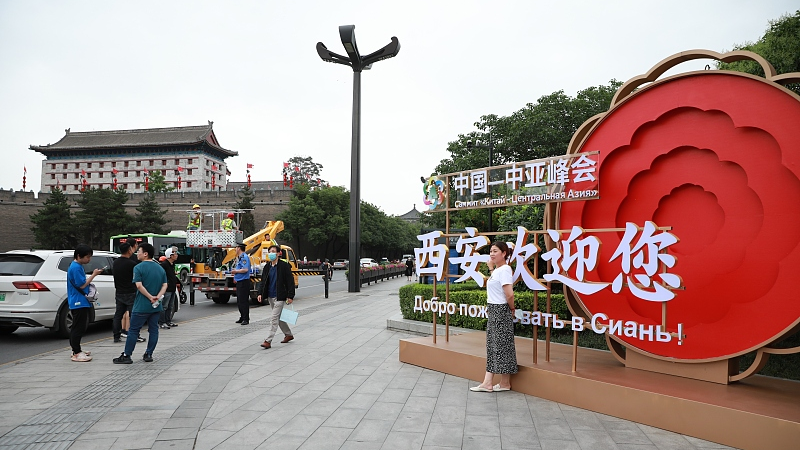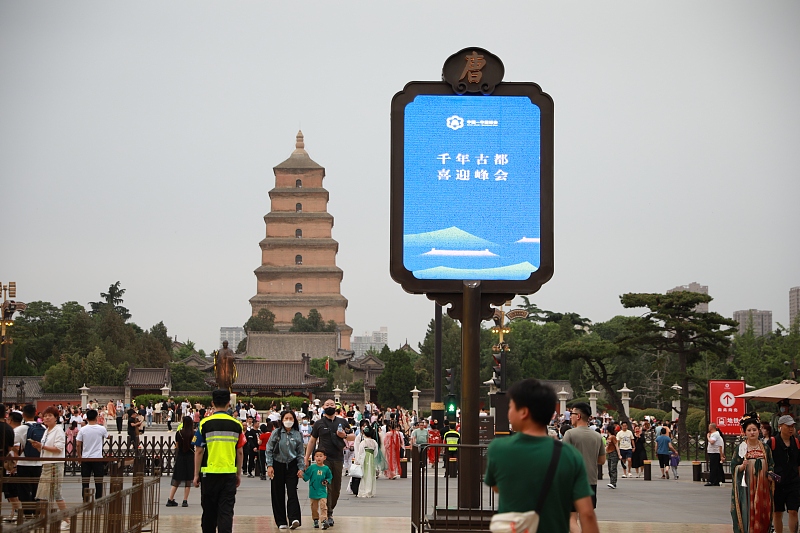
A themed installation for the China-Central Asia Summit in Xi'an, China's Shaanxi Province, May 17, 2023. /CFP
A themed installation for the China-Central Asia Summit in Xi'an, China's Shaanxi Province, May 17, 2023. /CFP
Editor's note: Hannan Hussain is a foreign affairs commentator, author and assistant research associate at the Islamabad Policy Research Institute. The article reflects the author's opinions and not necessarily the views of CGTN.
From May 18 to 19, Chinese President Xi Jinping hosts leaders of Kazakhstan, Kyrgyzstan, Tajikistan, Turkmenistan, and Uzbekistan in Xi'an for the first-ever China-Central Asia Summit. The event has been described as a "milestone in the history" of China's relations with the region. It is expected to feature more than 20 bilateral and multilateral activities throughout its two-day course.
The summit should also be seen as a valuable opportunity to advance heads of state diplomacy through bilateral talks, effectively strengthening important consensuses on economy, energy and security on the sidelines.
Talks between President Xi and Kazakh counterpart Kassym-Jomart Tokayev yielded a wide-ranging joint statement to scale up trade, investment, and the Belt and Road Initiative (BRI) cooperation long term. That is a major win for bilateral trade, which exceeded a record-setting $31 billion in 2022, propelling Kazakhstan's exports to China to grow by over a third. In an interview before his visit, Tokayev expressed his desire to strike these "new agreements" and "new deals" to propel economic ties in a complex global environment.
The latest consensus on deepening pragmatic BRI cooperation reinforces Kazakhstan's substantial importance in China's shared connectivity vision for Central Asia. It stands to herald a new era of growth on the back of past achievements, such as the China-Kazakhstan Lianyungang Logistics Base (offering Kazakhstan lucrative access routes to the Pacific), and a dual-port border with China's Xinjiang Uygur Autonomous Region that recently facilitated over 13,000 China-Europe freight train passings.
Talks with President Shavkat Mirziyoyev of Uzbekistan could entail focus on new energy and development collaborations, alongside joint regional security challenges. For instance, both countries share borders with Afghanistan, and facilitated ministerial talks to further calls for political stability and security gains in Afghanistan.
At the same time, consistent progress in major energy and development projects involving Uzbekistan has strengthened their comprehensive strategic partnership. Projects include the China-Central Asia Gas Pipeline and the China-Uzbekistan-Kyrgyzstan Railway project, a major component of Eurasian connectivity.
For Tajikistan, China serves as the largest trading partner and biggest source of foreign investment. High-level talks on the sidelines could lend optimism to more productive trade and investment agreements, and drive greater synergies between the BRI and Tajikistan's 2030 National Development Strategy. Xi's exchange with Tajikistan's President Emomali Rahmon could also play a key role in scaling cooperation across fields of economy, trade, investment, energy, education and tourism, as agreed between Tajik and Chinese foreign ministers in April.

An electronic billboard is displayed in Xi'an, China's Shaanxi Province, May 17, 2023. /CFP
An electronic billboard is displayed in Xi'an, China's Shaanxi Province, May 17, 2023. /CFP
Kyrgyzstan was among the first nations to endorse the BRI. Since its participation, it has witnessed wide-ranging socioeconomic dividends for its people. High-level talks could further cement BRI cooperation through the signing of documents across energy, economics and transportation fields, according to Kyrgyzstan's China envoy. Moreover, progress on major projects, such as the China-Kyrgyzstan-Uzbekistan (CKU) international highway, carries substantial promise for deepening regional connectivity, especially through new trade routes that benefit Kyrgyzstan's economic integration considerably.
When Turkmenistan's President Serdar Berdimuhamedov visited China in January, Xi hailed natural gas collaboration as the "cornerstone" of bilateral ties. He also called on both sides to expand energy cooperation "on a priority basis." Bilateral talks provide an ideal opportunity to revisit that consensus to motivate cooperation in green energy, natural gas utilization, and extraction technologies fields. Beijing continues to view Turkmenistan as a central pillar in its first transnational gas pipeline – the China-Central Asia Gas Pipeline – and has played a major role in facilitating the country's export diversification strategy.
The inaugural summit's vision for a China-Central Asia community with a shared future couldn't have arrived at a better time. Economic and development cooperation between both sides continues to grow by leaps and bounds. On trade alone, China and Central Asian states witnessed a $20 billion increase since the launch of the BRI in 2013, totaling $70.2 billion in 2022. The cumulative turnover of completed investment projects also reached $63.9 billion in March, underscoring the Summit's significance in consolidating a blueprint for shared future growth.
"We believe that the summit in Xi'an, where the ancient Silk Road began, is set to reinvigorate the millennia-old trade route and herald a promising outlook for China-Central Asia cooperation," said Chinese Foreign Ministry Spokesperson Wang Wenbin during a regular press conference on May 16.
By envisioning an ever-strengthening and highly adaptable China-Central Asia relationship, the landmark summit paves the way for an enduring consensus on win-win progress and what it delivers in the interests of all.
(If you want to contribute and have specific expertise, please contact us at opinions@cgtn.com. Follow @thouse_opinions on Twitter to discover the latest commentaries in the CGTN Opinion Section.)